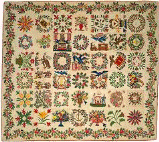Textile Society of America

Textile Society of America: Symposium Proceedings
Date of this Version
2008
Document Type
Article
Citation
Textiles as Cultural Expressions: Proceedings of the 11th Biennial Symposium of the Textile Society of America, September 24–27, 2008, Honolulu, Hawaii
Abstract
Introduction
Within just 30 years of the first introduction of American quilts to Japan, quiltmaking has become one of the most popular forms of needlework among Japanese women. It is estimated that there are now 2 to 3 million quiltmakers in Japan, which is one of the world’s largest quilt populations. Unlike American quiltmakers, who often learn to quilt through informal practice with friends, families or local communities and by attending short-term workshops, many Japanese quiltmakers learn quiltmaking within an established organizational structure that administers teaching and certification programs.
This paper examines Japan’s unique approach to teaching quiltmaking through the certification programs as well as the importance of these programs for the growing quilt population. In particular, it focuses on the certification programs offered by the Japan Handicraft Instructors’ Association (JHIA), one of the major needlework schools in Japan. The JHIA is a non-profit organization that has attracted a significant number of quilt-enthusiasts to its classes modeled after the Japanese traditional cultural teaching structure called the iemoto system.
In order to explore how this traditional teaching system was adopted and accepted in the modern quilt industry, I interviewed the founder of the JHIA as well as quilt instructors and students who were actively involved in the JHIA’s certification programs. In addition, I also observed several classes to research how Japanese women actually learn quiltmaking in a rigidly structured environment.1 I argue that quiltmaking in Japan effectively appropriates the existing system of cultural learning—the iemoto system—and that the popularization of quiltmaking in Japan owes a great deal to these certification programs offered by major quilt schools.


Comments
Copyright 2008 by the author.